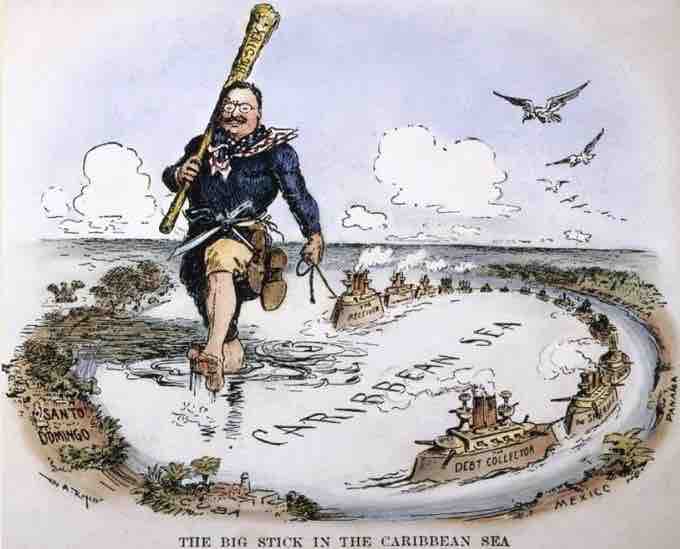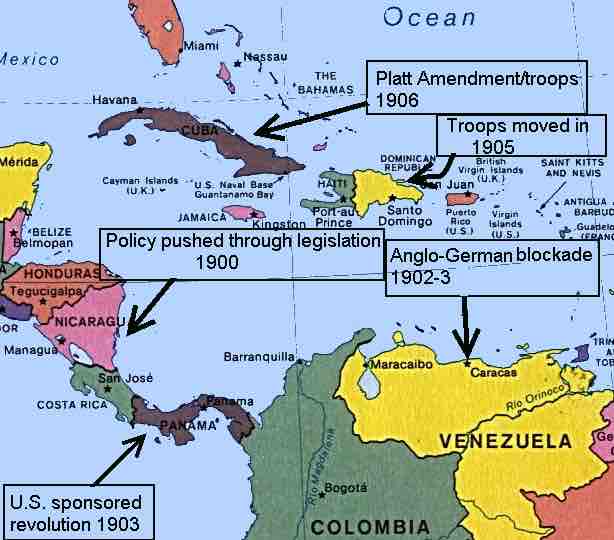The term "big-stick diplomacy" refers to President Theodore Roosevelt's corollary to the Monroe Doctrine, and is taken from his famous quote, "Speak softly, and carry a big stick." Roosevelt attributed the phrase to a West African proverb, "Speak softly, and carry a big stick; you will go far," but the claim that it originated in West Africa has been disputed. Essentially, big-stick diplomacy is the idea of negotiating peacefully with other nations while simultaneously threatening them with displays of military muscle. Roosevelt first used the phrase in a speech at the Minnesota State Fair on September 2, 1901, 12 days before the assassination of President William McKinley, which subsequently thrust him into the presidency. As president, Roosevelt described his style of foreign policy as, "the exercise of intelligent forethought and of decisive action sufficiently far in advance of any likely crisis."

"The Big Stick in the Caribbean Sea"
A cartoon depicting Roosevelt's big stick and naval muscle in Latin America.
The Roosevelt Corollary
The Roosevelt Corollary is an addition to the Monroe Doctrine that was articulated by President Roosevelt in his State of the Union address in 1904. The corollary states that the United States will intervene in conflicts between European nations and Latin American countries to enforce legitimate claims of the European powers, rather than having the Europeans press their claims directly. Roosevelt tied his policy to the Monroe Doctrine, and it was also consistent with his foreign policy included in his big-stick diplomacy. Roosevelt stated that in keeping with the Monroe Doctrine, the United States was justified in exercising, "international police power" to put an end to chronic unrest or wrongdoing in the Western Hemisphere. While the Monroe Doctrine had sought to prevent European intervention, the Roosevelt Corollary was used to justify U.S. intervention throughout the hemisphere.
Background: The Venezuelan Affair
In late 1902, Britain, Germany, and Italy implemented a several-month-long naval blockade against Venezuela because of the Venezuelan president's refusal to pay foreign debts and damages suffered by European citizens in a recent Venezuelan civil war. The incident was called the "Venezuela Crisis" of 1902–1903, and an international court concluded on February 22, 1904, that the blockading powers involved in the Venezuela Crisis were entitled to preferential treatment in the payment of their claims. The United States disagreed with the decision in principle, and feared that it would encourage future European intervention to gain such advantage. In order to preclude European intervention, the Roosevelt Corollary was created to assert the United States' right to intervene in order to "stabilize" the economic affairs of small states in the Caribbean and Central America if they were unable to pay their international debts.
Using the Corollary
The Roosevelt Corollary was supposed to be an addition to the Monroe Doctrine; however, it could be seen as a departure. While the Monroe Doctrine said European countries should stay out of Latin America, the Roosevelt Corollary took this further to say that the United States had the right to exercise military force in Latin American countries in order to keep European countries out. In other words, while the Monroe Doctrine sought to bar involvement by European empires, the Roosevelt Corollary announced America's intention to take their place. The Corollary rejected territorial expansion, but upheld interventionism.
U.S. presidents cited the Roosevelt Corollary as justification for U.S. intervention in Cuba (1906–1909), Nicaragua (1909–1910, 1912–1925, and 1926–1933), Haiti (1915–1934), and the Dominican Republic (1916–1924). As president from 1914–1921, Woodrow Wilson frequently intervened in Latin America using the justification of the Roosevelt Corollary.
Nicaragua and Panama Canal Affair
Roosevelt also wielded his "big stick" following the questionable diplomatic actions of the U.S. government to sponsor and pursue a canal project across Central America. Both Nicaragua and Panama experienced Roosevelt's signature diplomacy in canal-related incidents.
In 1901, Secretary of State John Hay pressed the Nicaraguan government for approval of a canal. The deal was that Nicaragua would receive $1.5 million in ratification, plus $100,000 annually, and the United States would, "provide sovereignty, independence, and territorial integrity" to Nicaragua. Nicaragua then returned the contract draft with a change: Instead of an annual $100,000, they wished to receive $6 million in ratification. The United States accepted the deal, but after Congress approved the contract, the problem of court jurisdiction arose. Many anti-canal advocates argued that because the United States did not have legal jurisdiction in Nicaragua, it could not sponsor a canal project.
After Nicaragua was ruled out, Panama was the obvious choice for U.S. leaders determined to build a Central American canal. However, Panama also posed numerous logistical and political problems. As Panama was then a region of Colombia, the United States was subject to the whims of the Colombian government and of manufacturing companies that provided the construction materials at a higher price. Roosevelt refused to pay the higher than expected fees and responded with an "engineered revolution" in Colombia that aimed for the secession of Panama.
On November 3, 1903, Panama (with the support of the U.S. Navy) revolted against Colombia and declared itself a republic, receiving $10 million from the United States for the canal project. Colombia had little diplomatic recourse and was no match for U.S. military strength, so it was forced to concede Panama's independence. Panama also received an annual payment of $250,000, and a guarantee of national independence. The United States, on the other hand, gained the rights to the canal strip "in perpetuity." Roosevelt later said that he, "took the Canal, and let Congress debate" the matter after the event.

Big-stick diplomacy in Latin America
A map showing the places affected by Roosevelt's big-stick diplomacy.